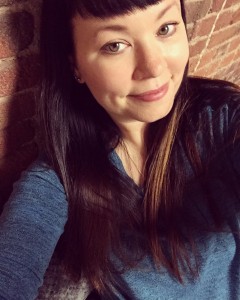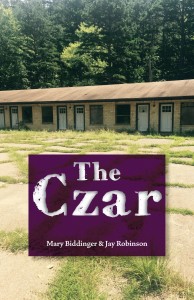Mary Biddinger is a Professor of English at the University of Akron, where she teaches poetry writing and literature, and edits the Akron Series in Poetry at the University of Akron Press. She is the recipient of a 2015 National Endowment for the Arts creative writing fellowship in poetry, and is currently working on a book-length volume of prose poems.
Recently, she agreed to sit down with Jenny and answer a few questions about her newest poetry collection The Czar and herself as a writer.
 Your new book The Czar was published in August. What is it about? Was there something in particular that inspired it?
Your new book The Czar was published in August. What is it about? Was there something in particular that inspired it?
Thanks for asking about The Czar. I wrote this poetry collection with my friend Jay Robinson, and it started as a joke. We were chatting in my office, as we often do, and started making quips about a fictional czar, an imaginary figurehead replete with ridiculousness to the point that it was totally comic. The series began with one poem written collaboratively in a Google doc, and then grew into a book-length collection. Our main hope was to critique things such as conspicuous consumption and abuse of power through our treatment of the czar, but we also ended up creating some memorable characters in the process. We are thankful to our publisher, Black Lawrence Press, for their support of poetry collaborations, including ours.
So you co-wrote The Czar with Jay Robinson. What was that experience like? How does it differ from writing a poetry collection by yourself?
Two of the hardest parts of writing a poem are getting started, and finding the right ending (or realizing that you ended the poem several stanzas ago, and just kept spinning your wheels unnecessarily). When I wrote The Czar with Jay, we alternated between starting and finishing the poems; I started a poem, and then he finished it, and vice versa. This enabled us to get more fanciful with our ideas, without having to wonder how we would ever bring the concept to fruition. They only had to be half ideas, after all, and then a fresh mind and sensibility would tag in and finish things up. Collaborating also helped me feel more confident with the project as a whole, since there was always a second opinion handy.
When writing a book-length collection with a collaborator, you might potentially have to argue with your collaborator over things such as edits and sequencing, rather than arguing with yourself over these things. Jay was an ideal collaborator because we have been editing each other’s poems for over a decade, and have worked together extensively on Barn Owl Review. The Czar, in a way, wrote itself. We’re hoping there may be a sequel someday.
 What is your personal creative process normally like? How do you move from an idea to a finished piece?
What is your personal creative process normally like? How do you move from an idea to a finished piece?
My process is always frantic, so it’s a good thing that I’m a poet and can work in a compressed form. I do best when I jot down my thoughts before writing, so when I actually get a spare moment I can jump right in with minimal fanfare. For me, the drafting process is relatively quick, and then I save the file and back away from the desk and let it rest for a while. I try to write without second guessing, and I like finishing a poem in one sitting.
Right now I am almost done with a new collection that is all prose poems, and with this book I have tried to write longer poems in multiple installments. The majority of the poems in this project are organized into five stanzagraphs, and having some distance from the poem’s initial stanzas can help me craft effective turns. Often I’ll over-write a poem, and then go back and trim excess before considering it finished. I do reach a point where I stop tinkering, however, rather than feeling like a poem is never done.
Where do you find inspiration? What other works—poetry or otherwise—do you think had an influence on you?
I find quite a bit of inspiration for my poetry in reading fiction, believe it or not. I lose myself in hefty, dramatic novels like The Goldfinch and A Little Life, and then try to use the profound feelings that I experience when reading novels in my own poems. I’m also inspired by landscape, particularly falling-down, rusted stuff.
What compels you to work with poetry in particular, instead of other creative endeavors? Or do you also have creative endeavors outside of poetry?
When I was an undergraduate I took both poetry and fiction workshops, and tended to favor poetry for its compactness (both in terms of creating and sharing with others). I love the way that poems stick with you, and how you can return to them during those in-between moments of a day.
In addition to writing poems, I enjoy photography and recently had the honor of seeing one of my pictures appear as the cover image of Allison Joseph’s new chapbook Multitudes. In photos, as well as in poems, I aspire to capture the gritty beauty of the Midwest.
How do you balance your creative urges with other responsibilities—personal and professional? How do you find time and energy to write amidst the rest of your day?
I’m perpetually envious of people who have designated “writing time.” I’ve never had this, so it’s always a matter of writing in the odd spare moments of the day. I spend much more time answering work emails, doing laundry, and nagging my kids than I do writing poems. Thus, I have to start writing poems in my head while doing other things. It’s like daydreaming, but with poems.
The biggest pitfall of this method is when I think I’ll remember a line, and fail to write it down, and then poof! It’s gone forever. I’ve started keeping poem lines and ideas in the notes section of my phone, as well as in a series of tiny notebooks, on the backs of receipts, on the agenda for administrative meetings, on a gum wrapper, or anywhere else where I might jot a line. Later I’ll discover these slips of paper—the sticky notes stuck to the back of a calculator, the piece of junk mail with one mysterious word scrawled on the back—and remember that it’s probably time to write another poem.
All of Mary Biddinger’s books, including The Czar, can be found at the Black Lawrence Press website.